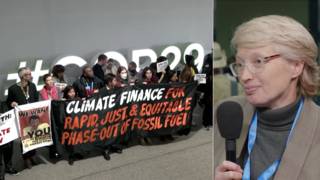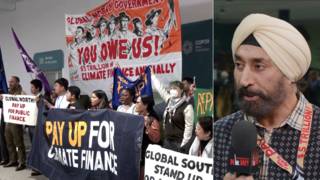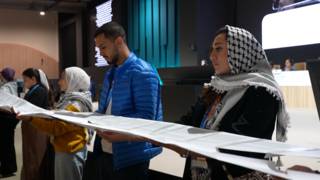
Related
Supreme Court nominee Sonia Sotomayor appears headed to a speedy confirmation after her last day of questioning on Capitol Hill. On Thursday, the ranking Republican on the Senate Judiciary Committee, Senator Jeff Sessions, said he won’t try to filibuster a vote on Sotomayor’s nomination. During her closing remarks, Sotomayor said her judicial record in untainted by personal views. Democracy Now!'s Juan Gonzalez reports on this week's hearings. [includes rush transcript]
Transcript
AMY GOODMAN: Well, Juan, it’s good to have you back in New York. You’ve been in Washington for the last four days covering the Sotomayor confirmation hearings.
JUAN GONZALEZ: Yes. And in really historic hearings, Judge Sotomayor did very well, in terms of being able to respond to a wide range of questions. Obviously, as most Supreme Court nominees in recent years, she refused to talk about her opinions about anything that might be pending legislation. But I think, generally speaking, she did very well, impressed not only the Democrats, who were already favorable to her, but many of the Republicans, as well. And it’s now expected that she will have easy sailing in terms of her confirmation by the Senate.
I think one of the things I wanted to point out that got almost no attention was Judge Sotomayor’s response to questionings by both Senators Kohl and Grassley about the issue of Kelo, the New Haven case — I’m sorry, the New London case where — dealt basically with the issue of eminent domain and under what conditions could governments take private property for public uses, especially for private developments. And interestingly, I think that this may be one of the first cases where her being on the Supreme Court may make a major difference. That case was decided 5-4, and it was basically the conservative justices on the court who were in the dissent on this issue. And while she clearly stated that it is now precedent what — the decision of Kelo, she clearly said that she understands the public concern and citizen concern, and she specifically noted that in one particular case that she handled, that had to do with a government’s taking of private properties, she upheld the citizens, because they were able to challenge the method by which the government took the property. And on two occasions, she said, “I hear you. I understand the issue.” And while she could not say how she would rule in the future, I think that if she were to turn on that issue of Kelo, that would mean really a possible change in terms of how eminent domain cases would be dealt with in the future when it comes to private development, a government’s taking property for private developers to use for what is, quote, a “public purpose.” So I think that’s a nuance of her testimony that didn’t get any attention in any of the coverage that I’ve seen.
AMY GOODMAN: And overall, just the atmosphere of the hearing room in the Hart Office Building?
JUAN GONZALEZ: Well, it was jammed. Two hundred to 250 reporters early on. It dropped off in the last couple of days. But I think that the sense that the court and the country was about to make history with the first Hispanic member of the Supreme Court was clearly evident, the third woman. And I think, again — I think Mayor Bloomberg had one of the funniest lines. When he testified, he said, “It’s good to see the court is having diversity: since it already has a justice from Brooklyn and a justice from Queens, now it will have a justice from the Bronx, as well.”
AMY GOODMAN: You mean, we’re about to have a “wise Latina” justice?
JUAN GONZALEZ: And a wise Latina justice, indeed.












Media Options